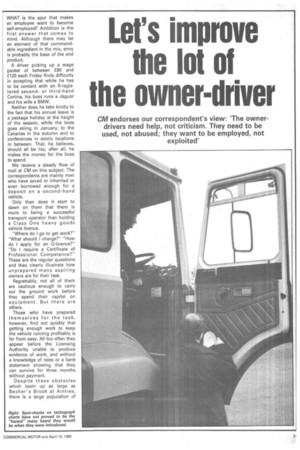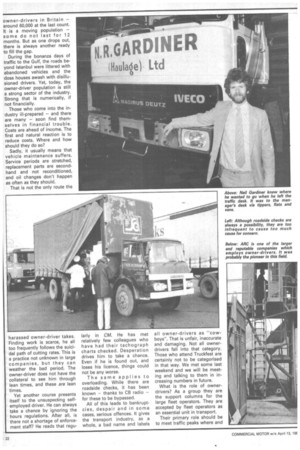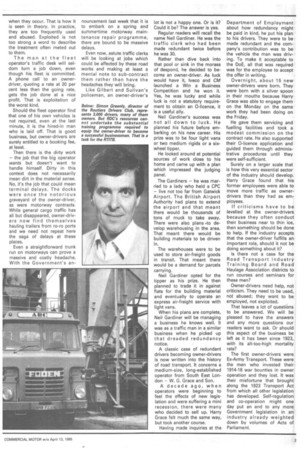Let's improve the lot of the owner-driver
Page 23

Page 24

Page 25

If you've noticed an error in this article please click here to report it so we can fix it.
CM endorses our correspondent's view: 'The ownerdrivers need help, not criticism. They need to be used, not abused; they want to be employed, not exploited'
WHAT is the spur that makes an employee want to become self-employed? Ambition is the first answer that comes to mind. Although there may be an element of that commendable ingredient in the mix, envy is probably the base of the end product.
A driver picking up a wage packet of between £80 and £120 each Friday finds difficulty in accepting that while he has to be content with an R-registered secondor third-hand Cortina, his boss runs a Jaguar and his wife a BMW.
Neither does he take kindly to the fact that his annual leave is a package holiday at the height of the season, while the boss goes skiing in January, to the Canaries in the autumn and to conferences in exotic locations in between. That, he believes, should all be his; after all, he makes the money for the boss to spend.
We receive a steady flow of mail at CM on this subject. The correspondents are mainly men who have saved or inherited or even borrowed enough for a deposit on a second-hand vehicle.
Only then does it start to dawn on them that there is more to being a successful transport operator than holding a Class One heavy goods vehicle licence.
"Where do I go to get work?" "What should I charge?" "How do I apply for an 0-licence?" "Do I require a Certificate of Professional Competence?" These are the regular questions and they clearly illustrate how unprepared many aspiring owners are for their task.
Regrettably, not all of them are cautious enough to carry out the ground work before they spend their capital on equipment. But there are others.
Those who have prepared themselves for the task, however, find out quickly that getting enough work to keep the vehicle running profitably is far from easy. All too often they appear before the Licensing Authority unable to produce evidence of work, and without a knowledge of rates or a bank statement showing that they can survive for three months without payment.
Despite these obstacles which loom up as large as Becher's Brook at Aintree, there is a large population of owner-drivers in Britain — around 60,000 at the last count. It is a moving population — some do not last for 12 months. But as one drops out, there is always another ready to fill the gap.
During the bonanza days of traffic to the Gulf, the roads beyond Istanbul were littered with abandoned vehicles and the doss houses awash with disillusioned drivers. Yet, today, the owner-driver population is still a strong sector of the industry. Strong that is numerically, if not financially.
Those who come into the industry ill-prepared — and there are many — soon find themselves in financial trouble. Costs are ahead of income. The first and natural reaction is to reduce costs. Where and how should they do so?
Sadly, it usually means that vehicle maintenance suffers. Service periods are stretched, replacement parts are second-, hand and not reconditioned, and oil changes don't happen as often as they should.
That is not the only route the harassed owner-driver takes. Finding work is scarce, he all too frequently follows the suicidal path of cutting rates. This is a practice not unknown in large companies, but they can weather the bad period. The owner-driver does not have the collateral to see him through lean times, and these are lean times.
Yet another course presents itself to the unsuspecting selfemployed driver. He can always take a chance by ignoring the hours regulations. After all, is there not a shortage of enforcement staff? He reads that regu
larly in CM. He has met relatively few colleagues who have had their tachograph charts checked. Desperation drives him to take a chance. Even if he is found out, and loses his licence, things could not be any worse.
The same applies to overloading. While there are roadside checks, it has been known — thanks to CB radio -for these to be bypassed.
All of this leads to bankruptcies, despair and in some cases, serious offences. It gives the transport industry, as a whole, a bad name and labels all owner-drivers as "cowboys". That is unfair, inaccurate and damaging. Not all ownerdrivers fall into that category. Those who attend Truckfest are certainly not to be categorised in that way. We met some last weekend and we will be meeting and talking to them in increasing numbers in future.
What is the role of ownerdrivers? As a group they are the support columns for the large fleet operators. They are accepted by fleet operators as an essential unit in transport.
Their primary role should be to meet traffic peaks where and when they occur. That is how it is seen in theory. In practice, they are too frequently used and abused. Exploited is not too strong a word to describe the treatment often meted out to them.
The man at the fleet operator's traffic desk will seldom turn a job down, even though his fleet is committed. A phone call to an ownerdriver, quoting a rate at 20 per cent less than the going rate, gets the job done at a nice profit. That is exploitation of the worst kind.
Should the fleet operator find that one of his own vehicles is not required, even at the last minute, it is the hired-in man who is laid off. That is good business, but owner-drivers are surely entitled to a booking fee, at least.
Then there is the dirty work — the job that the big operator wants but doesn't want to handle himself. Dirty in this context does not necessarily mean dirt in the material sense. No, it's the job that could mean terminal delays. The docks were once the notorious graveyard of the owner-driver, as were motorway contracts. While general cargo traffic has all but disappeared, owner-drivers now find themselves hauling trailers from ro-ro ports and we need not repeat here the saga of delays at these places.
Even a straightforward trunk run on motorways can prove a massive and costly headache. With the Government's an
nouncement last week that it is to embark on a spring and summertime motorway maintenance repair programme, there are bound to be massive delays.
Even now, astute traffic clerks will be looking at jobs which could be affected by these road works and making at least a mental note to sub-contract them rather than have the headaches they will bring.
Like Gilbert and Sulivan's policeman, an owner-driver's lot is not a happy one. Or is it? Could it be? The answer is yes.
Regular readers will recall the name Neil Gardiner. He was the traffic clerk who had been made redundant twice before he was 30.
Rather than dive back into that pool or sink in the morass of despond, he decided to become an owner-driver. As luck would have it, lveco and CM launched a Win a Business Competition and he won it. Yes, he was lucky and while luck is not a statutory requirement to obtain an 0-licence, it is a useful ally.
Neil Gardiner's success was not all down to luck. He planned his future before embarking on his new career. His prize was to be four light vans or two medium rigids or a sixwheel tipper.
He looked around at potential sources of work close to his home and came up with a plan which impressed the judging panel.
The Gardiners — he was married to a lady who held a CPC — live not too far from Gatwick Airport. The British Airport Authority had plans to extend the airport and that meant there would be thousands of tons of muck to take away. There were also plans to develop warehousing in the area. That meant there would be building materials to be driven in.
The warehouses were to be used to store air-freight goods in transit. That meant there would be a demand for parcels carrying.
Neil Gardiner opted for the tipper as his prize. He then planned to trade it in against flats for the building material and eventually to operate an express air-freight service with light vans.
When his plans are complete, Neil Gardiner will be managing a business he knows well. It was as a traffic man in a similar business when he picked up that dreaded redundancy notice.
A classic case of redundant drivers becoming owner-drivers is now written into the history of road transport. It concerns a medium-size, long-established operator from South East London — W. G. Grace and Son.
A decade ago, when operators were beginning to feel the effects of new legis lation and were suffering a mini recession, there were many who decided to sell up. Harry Grace felt much the same way, but took another course.
Having made inquiries at the Department of Employment about how redundancy might be paid in kind, he put his plan to his drivers. They were to be made redundant and the com pany's contribution was to be the vehicle the man was driving. To make it acceptable to the DoE, all that was required was for the employee to accept the offer in writing.
Overnight, about 15 new owner-drivers were born. They were born with a silver spoon in their mouths because Harry Grace was able to engage them on the Monday on the same work they had been doing on the Friday.
He gave them servicing and fuelling facilities and took a modest commission on the contract rate. He also supported their 0-licence application and guided them through administrative procedures until they were self-sufficient.
Surely on a larger scale that is how this very essential sector of the industry should develop. Harry Grace found that his former employees were able to move more traffic as ownerdrivers than they had as employees.
If criticisms have to be levelled at the owner-drivers because they often conduct their business near to thin ice, then something should be done to help. If the industry accepts that the owner-driver fulfills an important role, should it not be doing something about it?
Is there not a case for the Road Transport Industry Training Board and Road Haulage Association districts to run courses and seminars for these men?
Owner-drivers need help, not criticism. They need to be used, not abused; they want to be employed, not exploited.
That leaves a lot of questions to be answered. We will be pleased to have the answers and any more questions our readers want to ask. Or should this aspect of the business be left as it has been since 1923, with its all-too-high mortality rate?
The first owner-drivers were Ex-Army Transport. These were the men who invested their 1914-18 war bounties in owner operation and they lost. It was their misfortune that brought along the 1923 Transport Act from which all other legislation has developed. Self-regulation and co-operation might one day put an end to any more Government legislation in an industry already weighted down by volumes of Acts of Parliament,




















































































